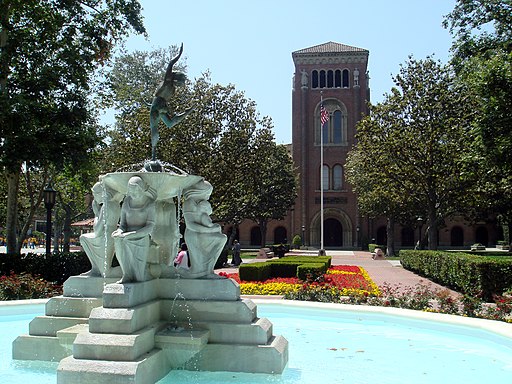How to Get into USC
November 07, 2024 :: Admissionado
How to Get into the University of Southern California
I. Introduction
About the University of Southern California
Located in the heart of Los Angeles, USC isn’t just a university—it’s a gateway to one of the most vibrant cities in the world. Founded in 1880, USC has grown to become a hub of academic excellence, creativity, and ambition. Known for its top-ranked programs in everything from film to business to engineering, USC attracts students who aren’t just looking to study but to make a mark. With its diverse student body and unparalleled access to industry connections, USC offers a launchpad for students to turn big dreams into reality.
The Competitive Nature of Admissions
USC is selective, with an acceptance rate of about 9% out of over 82,000 applicants. With its popularity and prestige on the rise, getting in means showing USC you’re ready to bring your A-game. While strong academics are important, USC looks for more than just high test scores—they want students who are driven, creative, and ready to embrace the energy of LA. If you’re excited about being part of a forward-thinking community, here’s your chance to show USC you’re a perfect fit.
II. Understanding USC’s Admissions Philosophy
Holistic Review Process
USC uses a holistic review process, which means they’re interested in the whole you—not just your GPA and test scores. They want to understand your story, your values, and what makes you unique. This approach allows them to see who you are as a person, not just a student. So, whether it’s your leadership in a community project or your passion for environmental science, let USC get a glimpse of what you’ll bring to their campus.
What USC Values in Applicants
At USC, creativity, diversity, and ambition are at the core of what they’re looking for in applicants. They want students who aren’t just passionate about learning but about making an impact. Whether that’s through arts, science, business, or volunteer work, USC seeks students who are engaged with the world around them and ready to take on new challenges. Show them you’re someone who thrives on creativity, embraces diversity, and is eager to contribute to USC’s lively, dynamic community.
III. Academic Excellence
Grade Point Average (GPA)
USC’s admitted students typically have high GPAs, often around 3.8 and above. But more than the number, USC values students who have challenged themselves. Taking advanced classes like AP, IB, or Honors shows that you’re not afraid to push yourself academically. A strong academic record with challenging coursework signals to USC that you’re ready to handle their rigorous curriculum.
Class Rank
While class rank isn’t officially required, many successful applicants are within the top 10% of their class. USC will look at your academic performance within the context of your school, so if you’re taking rigorous classes and earning strong grades, you’re showing that you’re competitive among your peers.
Course Rigor
USC values students who go above and beyond in their academic pursuits. If you’re interested in specific fields like business, cinema, or engineering, taking advanced courses related to these areas will strengthen your application. Showing USC that you’re dedicated to mastering challenging subjects can demonstrate your readiness for college-level work in your area of interest.
IV. Standardized Test Scores
SAT/ACT Requirements
USC’s average SAT scores for admitted students typically fall between 1450-1530, and ACT scores range from 32-35. USC practices superscoring for both the SAT and ACT, meaning they’ll consider your highest section scores across multiple test dates. Recently, USC adopted a test-optional policy, so you aren’t required to submit scores. If your scores are strong and within or above the average range, submitting them can boost your application. Otherwise, focus on other aspects of your application to show your strengths.
Test-Optional Policy
USC’s test-optional policy allows applicants to decide whether or not to submit standardized test scores. If you’re not confident that your scores represent your academic ability, you can choose to apply without them. USC will then place greater emphasis on other parts of your application, like GPA, coursework, and extracurriculars. This flexibility means you can highlight areas where you shine.
SAT Subject Tests and AP Scores
While USC doesn’t require SAT Subject Tests, high AP scores (4s and 5s) in relevant subjects can enhance your application, particularly if they relate to your intended major. Strong AP scores show that you’re ready for college-level coursework, and they can be especially beneficial if you’re applying to specialized programs like cinema or engineering.
V. Extracurricular Activities
Quality Over Quantity
USC is looking for students who have made a meaningful impact through their extracurricular activities. Rather than a long list of clubs, USC values depth—activities where you’ve shown dedication and growth. Whether you’ve spent years volunteering, leading a club, or developing a unique project, USC wants to see how you’ve engaged with your passions. Focus on showcasing the activities that have genuinely shaped you.
Leadership and Impact
Leadership is a big deal at USC. They want students who aren’t afraid to take initiative and make a difference. Think about where you’ve held a leadership role—whether as a club president, event organizer, or team captain—and how you’ve used that position to bring about positive change. Demonstrating that you can lead, inspire, and impact others shows USC that you’re prepared to contribute to their campus.
Passion Projects and Unique Interests
Got a unique hobby or passion? USC loves students with creative and entrepreneurial spirits. If you’ve started a YouTube channel, created a nonprofit, or built an app, make sure to include it. Unique projects reveal your drive, creativity, and self-motivation. Passion projects are a fantastic way to show USC who you are beyond academics.
VI. Personal Essays and Statements
USC-Specific Essay Prompts
USC’s supplemental essays are your chance to show why you and USC are a perfect match. Be specific here—mention programs, professors, or student organizations that align with your goals. Whether it’s the renowned School of Cinematic Arts, the entrepreneurial culture at Marshall School of Business, or cutting-edge research opportunities, your essay should demonstrate why USC is where you’ll thrive.
Writing an Authentic Personal Statement
The personal statement is your opportunity to share a unique part of your story. Maybe there’s a challenge that shaped your values, a passion that fuels your goals, or a dream that drives you. Authenticity is key—USC’s admissions officers read thousands of essays, so your real experiences and perspectives will make you memorable.
Common Pitfalls to Avoid
Avoid vague language and generic themes. USC is looking for essays that are specific and personal, so steer clear of overused topics. Think beyond clichés like “winning the big game” and aim to share something genuine and specific to you. Show USC what you care about and why.
VII. Letters of Recommendation
Selecting the Right Recommenders
USC values recommendations that go beyond academics, so choose teachers who know you well and can speak to your character, curiosity, and resilience. A teacher who’s seen you tackle challenges or push your limits can offer deeper insights than someone who only knows you on the surface. Pick someone who can highlight qualities USC values, like leadership, creativity, and dedication.
Providing Guidance to Recommenders
Help your recommenders write a compelling letter by sharing your resume or discussing your goals. This context allows them to frame their recommendations in a way that supports your application and highlights what USC is looking for in its students.
Supplemental Recommendations
If you have an additional mentor, coach, or employer who can offer a unique perspective, consider including a supplemental recommendation. Just make sure it adds something new to your application rather than repeating what’s already been covered by your academic recommenders.
VIII. The Interview Process
Interview Availability
USC offers interviews for certain programs, though they’re not always required. If you’re offered an interview, take it as a chance to connect one-on-one with someone who knows USC’s culture. It’s an opportunity to ask questions and share why USC is your top choice. An interview can add a personal dimension to your application and show USC you’re genuinely interested.
Preparing for the Interview
Before your interview, research USC’s programs, culture, and values. Be prepared to discuss why USC excites you, and think of a few specific reasons that tie into your academic and career goals. Coming with thoughtful questions about USC will show that you’re serious and well-informed.
Making a Positive Impression
Show up professionally, be enthusiastic, and don’t be afraid to let your personality shine. Remember, interviews are a conversation, so engage authentically. Following up with a thank-you note afterward is a great way to leave a positive, lasting impression.
IX. Demonstrated Interest
Campus Visits and Virtual Tours
If USC is at the top of your list, consider a campus visit or virtual tour. USC values demonstrated interest, and a visit can give you a feel for the campus culture, facilities, and student life. If you can’t visit in person, participating in a virtual event still shows that you’re serious about USC. It’s also a chance to learn more about the programs and opportunities that make USC unique, which can come in handy when writing your essays or preparing for an interview.
Engaging with Admissions
USC offers plenty of opportunities to connect with the admissions team through info sessions, webinars, and other events. Engaging in these events not only gives you insight into the university’s values and offerings, but it also shows admissions officers that you’re actively interested in USC. Making the effort to connect demonstrates that USC isn’t just another school on your list—it’s a place you’re genuinely excited about.
Utilizing Social Media and Online Platforms
Following USC on social media can help you stay up-to-date on events, student life, and important admissions information. Engage thoughtfully if possible; even a simple comment or like shows you’re invested. USC’s Instagram, Twitter, and LinkedIn accounts give an inside look at the campus culture, and observing current students’ posts and interactions can help you picture yourself as part of the Trojan Family.
X. Application Timing and Strategies
Early Action/Early Decision vs. Regular Decision
USC doesn’t offer Early Action or Early Decision, so all applicants apply through the Regular Decision process. This means everyone is evaluated in the same application pool, giving all students a fair shot regardless of timing. However, keep in mind that USC’s deadlines are strict, so aim to submit your application well before the due date to avoid any last-minute technical issues.
Application Deadlines and Timeline
USC’s Regular Decision deadline is typically in early January, but specific programs like Cinematic Arts or Architecture may have earlier deadlines. Make sure you’re aware of any program-specific requirements and deadlines, as missing them could impact your application. Staying organized and submitting everything on time shows USC you’re serious about attending.
Organizing Your Application Materials
Applying to USC means keeping track of multiple components—transcripts, essays, test scores, recommendations, and any additional materials for certain programs. Use a checklist or organization tool to ensure everything is submitted on time. An organized application reflects well on you, showing USC you’re detail-oriented and responsible.
XI. Financial Considerations
Understanding Tuition Costs
USC is a private university, and tuition and living expenses can be substantial. However, USC offers a wealth of resources, networking opportunities, and access to top-tier faculty, making it a strong investment. Be prepared to factor in additional costs like housing, meal plans, and personal expenses, especially if you plan to explore LA.
Financial Aid Opportunities
USC is committed to making education accessible, providing financial aid to support students from various economic backgrounds. The university offers both need-based and merit-based scholarships, and they meet 100% of demonstrated financial need for eligible students. If USC is your dream school, don’t let financial worries hold you back—apply for aid and explore the options available.
Applying for Financial Aid
To apply for financial aid, you’ll need to submit both the FAFSA and CSS Profile by USC’s priority deadlines. Double-check requirements to make sure you don’t miss any important documents. USC’s financial aid office is there to help, so don’t hesitate to reach out if you have questions or need guidance.
XII. Special Applicant Categories
International Applicants
USC values the global perspectives that international students bring to its campus. As an international applicant, you may need to submit TOEFL or IELTS scores if English isn’t your primary language. USC’s admissions team is experienced in reviewing international applications, so feel free to provide any context about your academic background and unique experiences. Highlighting your cultural perspective can add depth to your application and showcase what you’ll bring to the USC community.
Transfer Students
USC accepts a significant number of transfer students each year, many of whom bring rich experiences from community colleges or other four-year institutions. Successful transfer applicants typically have strong GPAs and clear goals about why USC is the ideal next step in their academic journey. If you’re applying as a transfer, emphasize how USC’s programs align with your future goals and what you’ll bring to the campus community.
Underrepresented Groups
USC is dedicated to fostering an inclusive environment and supporting underrepresented groups, from first-generation students to minority groups. Programs like the Norman Topping Student Aid Fund provide resources and guidance for students who may face unique challenges. If you’re part of an underrepresented group, share how your background has shaped you and how you envision contributing to USC’s diverse community.
XIII. Tips for Success
Starting Early
The earlier you start, the more time you’ll have to polish each part of your application. Ideally, start planning in your junior year to give yourself time for essay brainstorming, gathering recommendations, and (if applicable) preparing for standardized tests. Early preparation allows you to present your best self without the last-minute stress.
Seeking Guidance
College applications don’t have to be a solo effort. Seek guidance from mentors, counselors, teachers, or even USC alumni who can offer advice. Whether it’s essay feedback or insights into campus life, those with experience can provide invaluable support. If you know someone who’s attended USC, reach out—they might have the advice that makes all the difference.
Staying Authentic
USC is looking for students who are genuine, curious, and ready to bring something unique to campus. Don’t try to fit a mold; instead, let your personality, values, and aspirations come through. USC admissions officers can spot authenticity, so be true to yourself in every part of the application.
XIV. Frequently Asked Questions
How Important Are Test Scores vs. GPA?
USC evaluates applicants holistically, meaning GPA, test scores, and extracurriculars are all considered. With the test-optional policy, they’ll place more emphasis on GPA, course rigor, and extracurriculars if scores aren’t submitted. Strong grades in challenging courses show that you’re prepared for USC’s academic demands.
Can I Apply to Multiple California Schools?
Yes, and it’s common to apply to multiple top California schools like UCLA, UC Berkeley, and Stanford. Just be sure to tailor each application specifically for each school. Admissions officers can tell when an essay isn’t personalized, so make sure USC knows why it’s the best fit for you.
What If I Don’t Have Many Extracurriculars?
USC values quality over quantity, so don’t worry if you haven’t been involved in a wide range of activities. Focus on the depth of your involvement in the few that matter most to you. Highlight your dedication, leadership, and impact—these qualities will stand out more than a long list of unrelated clubs.
How Does USC View Gap Years?
USC is supportive of gap years, especially when they’re used for meaningful experiences like volunteering, work, or pursuing a personal project. A gap year can add depth to your application if you show how it’s prepared you for college. Be ready to discuss how the gap year has shaped your goals or worldview.
Are Interviews Required or Optional?
USC offers interviews for certain programs, but they’re generally optional. If you’re invited, take the opportunity to show your enthusiasm for USC and to ask questions about the campus experience. The interview can add a personal dimension to your application, demonstrating your genuine interest.
XV. Conclusion
Emphasizing Fit and Personal Growth
Applying to USC is about more than meeting requirements; it’s about showing why USC is the perfect environment for your growth. USC looks for students who align with its spirit of innovation, creativity, and ambition, so use your application to demonstrate why you’ll thrive on campus. Finding the right fit is key—not just for USC but for your personal and academic journey.
Final Encouragement
Applying to USC is a competitive process, but remember, each part of the application is a chance to tell your story. Stay focused, be authentic, and put forth your best effort. If you’re passionate about joining the Trojan Family, trust in the process and give it your all. Fight on!
Additional Resources
For more details on application deadlines, requirements, and additional resources, check USC’s official admissions website. The admissions team is there to answer questions, so don’t hesitate to reach out. Best of luck, and here’s to the next chapter of your journey at USC!



